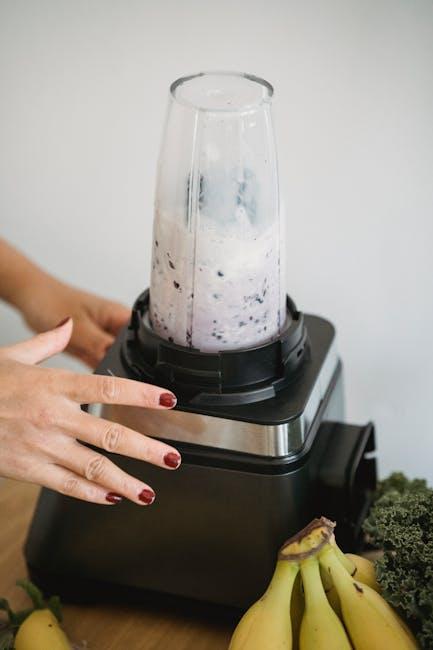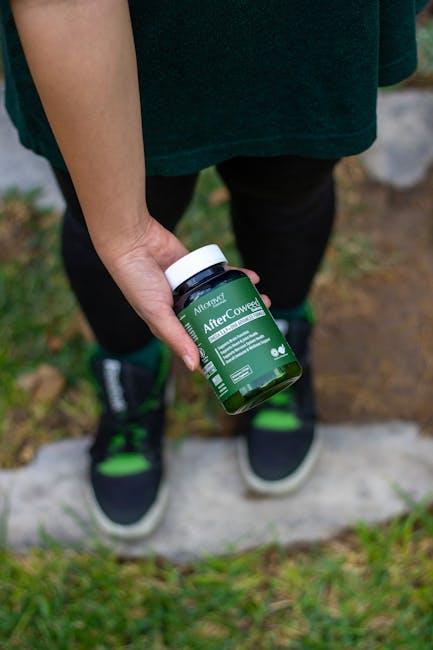In the intricate universe within us, our gut plays the starring role—quietly influencing our digestion, immunity, and even mood. Yet, it often goes unnoticed until discomfort takes center stage. Embracing daily routines that nurture gut health can transform this hidden world into a source of vibrant well-being. This article delves into simple, mindful habits that support a balanced digestive system, inviting you to tune in and cultivate harmony from the inside out.
Table of Contents
- Understanding the Role of Gut Health in Overall Wellness
- Nourishing Your Microbiome with Thoughtful Food Choices
- Crafting a Hydration Habit to Support Digestive Function
- Incorporating Movement and Mindfulness for a Balanced Gut
- Establishing Consistent Sleep Patterns to Enhance Gut Repair
- Q&A
- The Way Forward

Understanding the Role of Gut Health in Overall Wellness
Our gut is often called the “second brain” because it plays a pivotal role far beyond digestion. A well-balanced gut microbiome influences everything from our immune system to mental health. When the gut flora is thriving, it enhances nutrient absorption, supports the production of essential vitamins, and helps regulate inflammation throughout the body. Disruptions, on the other hand, can contribute to fatigue, mood swings, and even autoimmune conditions. Understanding this complex ecosystem empowers us to make choices that nurture our internal environment daily.
Simple lifestyle adjustments can strengthen gut function and promote overall wellness. Incorporating fiber-rich foods, such as leafy greens, whole grains, and fermented items, encourages the growth of beneficial bacteria. Additionally, staying hydrated and managing stress through mindfulness or gentle exercise helps maintain optimal digestive efficiency. Here’s a quick guide to visualize key elements influencing gut health:
| Factor | Positive Impact | Common Sources |
|---|---|---|
| Prebiotics | Feed good bacteria | Garlic, onions, bananas |
| Probiotics | Introduce live cultures | Yogurt, kefir, sauerkraut |
| Hydration | Supports digestion | Water, herbal teas |
| Stress Management | Reduces gut inflammation | Meditation, yoga |

Nourishing Your Microbiome with Thoughtful Food Choices
Embracing a diet rich in fiber-packed fruits and vegetables is one of the most effective ways to support a robust gut microbiome. These natural powerhouses serve as prebiotics, nourishing beneficial bacteria and encouraging their growth. Incorporating fermented foods such as yogurt, kimchi, and sauerkraut adds an extra layer of gut-friendly probiotics, fostering a diverse microbial environment. Remember, diversity is key — vary your choices to cultivate a vibrant and resilient ecosystem within your digestive tract.
Beyond individual foods, the timing and combination of meals play a crucial role. Eating slowly and mindfully allows your digestive system to function optimally, while combining different food groups enhances nutrient absorption. Consider these simple tips:
- Pair fiber-rich carbs with healthy fats to slow digestion and stabilize blood sugar.
- Avoid excessive sugar and processed foods that can disrupt microbial balance.
- Hydrate consistently to facilitate the movement of fiber through the gut.
| Food Type | Benefits for Microbiome | Example Foods |
|---|---|---|
| Prebiotics | Feeds good bacteria | Garlic, onions, asparagus |
| Probiotics | Adds beneficial microbes | Yogurt, kefir, kimchi |
| Polyphenols | Supports microbial diversity | Green tea, berries, dark chocolate |

Crafting a Hydration Habit to Support Digestive Function
Keeping your digestive system happy starts with a simple, yet powerful habit: consistently drinking enough water throughout the day. Adequate hydration helps to soften stool, promotes regular bowel movements, and enables your gut to efficiently absorb nutrients. To make hydration effortless, consider setting visual reminders or pairing water intake with daily activities such as meals or breaks. Many find success by using reusable bottles marked with time goals, turning hydration into a rewarding challenge rather than a chore.
Beyond plain water, infusing your routine with gut-friendly beverages can amplify benefits. Herbal teas like peppermint, ginger, or chamomile soothe the digestive tract and reduce bloating. Here’s a quick guide to integrating hydration with digestion-supportive drinks:
| Beverage | Benefit | Ideal Time |
|---|---|---|
| Peppermint Tea | Relaxes intestinal muscles | After meals |
| Ginger Infusion | Reduces inflammation | Morning |
| Warm Lemon Water | Stimulates digestion | Start of day |
Integrating these simple hydration habits can transform your gut health one sip at a time. Remember, consistency is key, so build your hydration routine at a pace that feels natural for you.

Incorporating Movement and Mindfulness for a Balanced Gut
Introducing gentle movement into your daily routine can serve as a secret ally for your digestive health. Activities like yoga, walking, or even stretching stimulate blood flow to the gut, encouraging smoother digestion and easing bloating. Engaging in these practices regularly not only boosts your metabolism but also promotes the rhythmic contractions of your intestines known as peristalsis, ensuring food moves effectively through your digestive tract.
Pairing physical activity with mindfulness deepens this connection between body and gut. Techniques such as deep breathing, meditation, or mindful eating help reduce stress, which is a common disruptor of gut function. By deliberately slowing down and tuning into your body’s signals, you can foster a harmonious environment for your microbiome to thrive. Consider integrating some of these approaches into your day:
- Meditative breathing: Spend 5 minutes focusing solely on your breath before meals.
- Gentle yoga flows: Use poses like Cat-Cow or Child’s Pose to gently massage your abdominal region.
- Mindful eating: Chew slowly, savor each bite, and put your utensil down between bites.
- Regular walks: A 20-minute walk after meals can enhance digestion and reduce gas.

Establishing Consistent Sleep Patterns to Enhance Gut Repair
Our bodies thrive on regularity, and this is especially true when it comes to sleep’s role in gut health. Maintaining a steady sleep schedule serves as a powerful catalyst for intestinal repair and microbial balance. When sleep patterns are erratic, they disrupt the production of essential hormones like melatonin, which play a critical role in soothing inflammation and promoting the regeneration of gut lining cells. Prioritizing a consistent bedtime and wake-up time can enhance the gut’s resilience by supporting the natural circadian rhythms that govern digestion and immune function.
To integrate sleep-enhancing habits that benefit your gut:
- Create a wind-down routine: Dim lights and minimize screen time an hour before bed to cue your body for rest.
- Optimize bedroom environment: Keep the room cool and quiet to foster uninterrupted, deep sleep cycles.
- Limit stimulants late in the day: Avoid caffeine and heavy meals within 3-4 hours of bedtime to prevent digestive discomfort and sleep disturbances.
| Sleep Quality | Gut Impact | Action Point |
|---|---|---|
| Deep Sleep | Supports hormone balance & cell repair | Maintain consistent bedtime |
| Light Sleep | Less effective intestinal recovery | Avoid blue light before bed |
| Interrupted Sleep | Increases inflammation & stress | Silence distractions, reduce noise |
Q&A
Q&A: Daily Routines for Better Gut Health
Q: Why should I care about gut health?
A: Your gut is more than just a food processor; it’s a bustling ecosystem influencing digestion, immunity, mood, and even sleep. A happy gut often means a happier you.
Q: What’s the simplest change I can make to improve my gut health?
A: Start with hydration. Drinking plenty of water each day keeps things moving smoothly through your digestive tract and supports the beneficial bacteria that call your gut home.
Q: How important is diet in maintaining gut health?
A: Diet is king. Incorporate fiber-rich foods like fruits, vegetables, whole grains, and legumes. These provide prebiotics—food for your gut’s friendly bacteria—which helps them flourish.
Q: Are probiotics necessary, or can I get all I need from food?
A: Probiotics can be a helpful boost but aren’t always essential if you eat fermented foods like yogurt, kimchi, sauerkraut, and kefir regularly. These naturally introduce beneficial bacteria into your gut.
Q: What role does stress play in gut health?
A: Gut and brain are best friends—stress can disrupt gut bacteria balance and digestion. Incorporate calming practices like meditation, gentle exercise, or deep breathing to keep your gut calm too.
Q: How often should I be moving to support my gut?
A: Regular movement aids digestion and promotes healthy bacterial diversity. Aim for at least 30 minutes of moderate activity most days—think walking, cycling, or yoga.
Q: Is sleep really connected to gut health?
A: Absolutely. Poor sleep can throw off your gut’s rhythm and microbial balance. Prioritize 7–9 hours of quality sleep to help your gut—and your body—rejuvenate.
Q: Can certain habits harm gut health?
A: Yes. Excessive alcohol, processed foods, and too many antibiotics can disrupt your gut bacteria. Moderation and mindful choices are key to nurturing your gut microbiome.
Q: How quickly can I expect to see results with better gut routines?
A: Some benefits, like improved digestion and energy, might appear in days to weeks; long-term changes in gut flora and overall health happen gradually, with consistent care.
Q: Any final advice for someone beginning their gut health journey?
A: Make small, sustainable changes rather than overhauling overnight. Listen to your body, stay curious, and remember that a thriving gut is a cornerstone of lasting wellness.
The Way Forward
Nurturing your gut health is a journey woven into the fabric of daily life. By embracing mindful routines—from what you eat to how you move and rest—you create a foundation for a thriving digestive system. Remember, small, consistent steps can lead to profound changes over time. So, as you step forward, let your daily habits be gentle acts of care that support not just your gut, but your overall well-being. Your body will thank you in ways you’ve never imagined.














Leave feedback about this